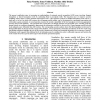199 search results - page 22 / 40 » Automatic Word Sense Discrimination |
ACL
2003
13 years 9 months ago
2003
We present a supervised machine learning algorithm for metonymy resolution, which exploits the similarity between examples of conventional metonymy. We show that syntactic head-mo...
CAISE
2004
Springer
14 years 29 days ago
2004
Springer
The so-called Semantic Web vision will certainly benefit from automatic semantic annotation of words in documents. We present a method, called structural semantic interconnections ...
COLING
2008
13 years 9 months ago
2008
Supervised approaches to Word Sense Disambiguation (WSD) have been shown to outperform other approaches but are hampered by reliance on labeled training examples (the data acquisi...
CLEF
2009
Springer
13 years 8 months ago
2009
Springer
Abstract. The Robust-WSD at CLEF 2009 aims at exploring the contribution of Word Sense Disambiguation to monolingual and multilingual Information Retrieval. The organizers of the t...
LREC
2008
13 years 9 months ago
2008
The present contribution aims at increasing our understanding of automatic speech recognition (ASR) errors involving frequent homophone or almost homophone words by confronting th...

